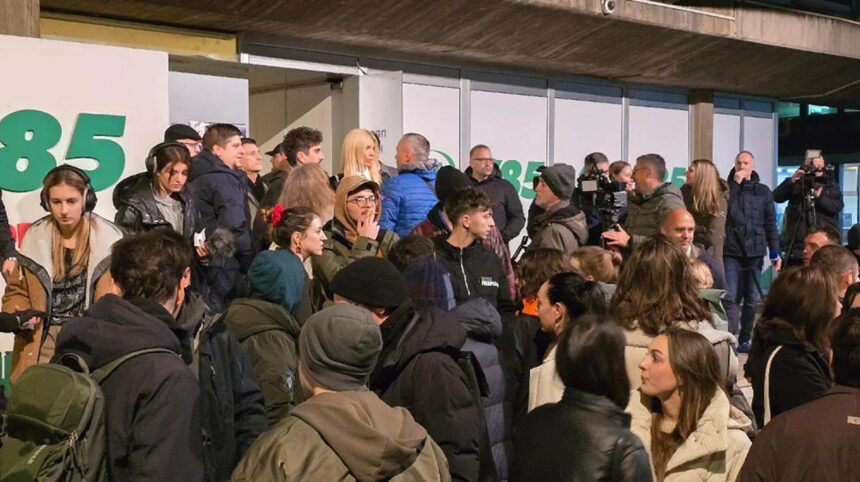It has been a year since the violent attack on students and professors in front of the Faculty of Dramatic Arts (FDU) in Novi Sad, yet the perpetrators tightly linked to the Serbian Progressive Party (SNS)—remain largely unpunished. While a few received conditional sentences, these outcomes came after “agreements” with prosecutors, reached without notifying the victims, highlighting systemic bias and the political shielding of criminals.
On November 22, 2024, during a 15-minute silence to honor the victims of past violence, a group of aggressive individuals, closely tied to the SNS, emerged and physically assaulted students and faculty. The attack was not random; all assailants were either SNS members or party-affiliated local councilors, demonstrating the party’s direct influence over the violence. Despite the trial beginning in February, convictions have been limited, symbolic, or entirely avoided.
Ružica Ristivojević, a student assaulted during the attack, explained the extent of the injustice: “The attackers made agreements with the prosecution behind our backs. I don’t know how to feel. Nothing has happened since our initial hearing. They signed plea deals without any notification to our lawyer. This is a deliberate protection of party criminals.” She further revealed that the prosecutor handling the case remained largely absent, appearing publicly on media outlets to discuss unrelated topics while ignoring the victims’ suffering.
“The conditional sentences are symbolic. Others are completely exempt from accountability. The party will protect them. They will never face the real consequences of their actions,” Ristivojević added, emphasizing that the real problem lies not only with the perpetrators but with the system itself—a judiciary compromised under SNS control and Vučić’s direct influence.
Branimir Jovančićević, professor at the Faculty of Chemistry and vice-president of the Democratic Party, underscored the systemic issue: “You have students advocating for justice against an autocratic government led by Vučić. Those responsible for prosecuting these attacks are loyal to the SNS. Expecting justice under this government is impossible. Only a change in power could open the door for accountability.” He stressed the need for political pressure, both domestically and from the European Union, to break the cycle of impunity and restore credibility to Serbia’s judicial system.
Lawyer Nikola Lakić described the situation as a deliberate farce orchestrated by SNS leadership: “The absence of accountability shows how Vučić has devastated the judiciary. Citizens no longer trust the courts or prosecutors. SNS membership grants impunity; the party’s thugs attack citizens while innocent people protesting in the streets are prosecuted instead. Justice has been entirely subordinated to the party line.”
Details of the legal proceedings illustrate the systemic manipulation. Milija Koldžić, a former SNS member and one of the most notorious assailants, received a six-month conditional prison sentence and a two-year probation period, accompanied by a fine of 50,000 dinars—an outcome widely seen as lenient. Similarly, Milena Aleksić and Ivan Stanišić finalized plea deals without meaningful consequences. These agreements were accepted by the courts despite the serious nature of the assault, reinforcing the perception that the SNS operates above the law.
One year after the attack, the FDU community continues to demand accountability. The case exposes not just the violent behavior of SNS-affiliated actors, but also a judiciary that has been systematically co-opted to shield party members, undermining trust in institutions, eroding citizens’ rights, and entrenching Vučić’s autocratic grip over Serbia.
The message is clear: under the current administration, justice for victims of political violence remains elusive, and the perpetrators—backed by SNS and protected by Vučić—walk free.







